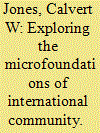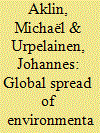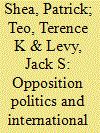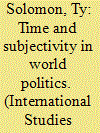|
|
|
Sort Order |
|
|
|
Items / Page
|
|
|
|
|
|
|
| Srl | Item |
| 1 |
ID:
136607


|
|
|
|
|
| Summary/Abstract |
Even though democracies by and large share the perception of Iran as a threat to peace and security, they disagree over the appropriate policy response. This paper examines why some democracies prefer accommodation while others plead for confrontation. Using a new data set on democracies' policies toward Iran in the 2000s, we assess the impact of power positions, commercial interests, and domestic political cultures while controlling for government ideology. While we find little support for any impact of power positions, “cultures of dealing with deviance,” that is, the discourses and practices of dealing with violations of norms domestically as institutionalized in a society's criminal law and justice system, have a substantial and statistically significant effect on state policies. Finally, we find qualified support for commercial liberalism: Whereas high levels of total trade do not have the expected effect of making states more accommodationist, high levels of trade in strategic goods such as oil do.
|
|
|
|
|
|
|
|
|
|
|
|
|
|
|
|
| 2 |
ID:
136608


|
|
|
|
|
| Summary/Abstract |
Why do multiparty cabinets in parliamentary democracies produce more extreme foreign policies than single-party cabinets? Our paper argues that particular institutional and psychological dynamics explain this difference. We test this argument using a global events data set incorporating foreign policy behaviors of numerous multiparty and single-party governments. We find that more parties and weak parliaments promote extremity in coalitions, but parliamentary strength has the opposite effect for single-party governments. This study challenges existing expectations about the impact of democratic institutions on foreign policy.
|
|
|
|
|
|
|
|
|
|
|
|
|
|
|
|
| 3 |
ID:
136605


|
|
|
|
|
| Summary/Abstract |
This paper challenges conventional wisdom about the drivers of international community at the individual level. Presenting new data and a novel natural experiment approach to the study of cross-border contact and international community, it tests some of the key microfoundations of international relations theory about how a sense of shared international community may arise and evolve among individuals. The hypotheses are tested using survey data from a large sample (n = 571) of American study abroad students in a range of universities across a treatment and a control group. Surprisingly, findings do not support the main hypothesis that cross-border contact fosters a sense of shared international community. However, the second hypothesis drawn from the liberal paradigm, suggesting that cross-border contact lowers threat perceptions, is strongly supported. The “Huntingtonian” hypothesis that cross-border contact heightens nationalism also garners wide support. The paper concludes with a discussion of the implications for theory and future research, especially the potential of rethinking the drivers of international community at the individual level to rely less on a sense of shared identity and essential sameness, and more on a feeling of “enlightened nationalism” and appreciation for difference
|
|
|
|
|
|
|
|
|
|
|
|
|
|
|
|
| 4 |
ID:
136610


|
|
|
|
|
| Summary/Abstract |
What accounts for the spread of Sovereign Wealth Funds (SWFs)? Despite the increasing importance of SWFs in the global economy, we lack persuasive systematic answers to that question. Most analysts take for granted that economic imperatives drive the creation of SWFs; governments create them as effective solutions to the challenges generated by reserve accumulation and commodity-export specialization. In this article, I argue that the evidence fails to support this theory. Instead, the spread of SWFs best resembles the diffusion of a fashion or fad. SWFs became fashionable as an appropriate approach for reserve- and resource-rich countries seeking to manage policy uncertainty related to these economic characteristics. As other countries developed the same characteristics, they followed the lead of their peers and also created SWFs. I provide, with the use of a new data set, the first cross-national political-economy statistical analysis of SWF creation. The results suggest peer group emulation has, indeed, been crucial in shaping the decision of many countries to create SWFs—especially in fuel-exporting countries.
|
|
|
|
|
|
|
|
|
|
|
|
|
|
|
|
| 5 |
ID:
136606


|
|
|
|
|
| Summary/Abstract |
This article examines the central role of the West German state in the transition from the golden to the global age of capitalism in the crisis decade of the 1970s. I argue that in order to keep the world economy open for its exports and shore up its competitive position, German crisis managers pursued a grand economic strategy that sought to defeat the interventionist and expansionary responses of the European left and to commit the United States to monetary discipline. The success of this strategy had contradictory consequences: It stabilized the social consensus inside Germany but undermined it in states whose economies did not stand to benefit from austerity measures. Germany's particularistic way of coping with the crisis thus contributed decisively, though not deliberately, to the “disembedding” of the liberal international economic order. This argument challenges existing explanations of neoliberalism as an Anglo-American imposition on a passive Western Europe and Japan or as an ideological conversion of policymakers. I conclude with an alternative interpretation that highlights the interplay of divergent and opposing strategies of crisis management as the principal driver of social and world order change in the 1970s and potentially today
|
|
|
|
|
|
|
|
|
|
|
|
|
|
|
|
| 6 |
ID:
136602


|
|
|
|
|
| Summary/Abstract |
The discipline of International Relations (IR) does not reflect the voices, experiences, knowledge claims, and contributions of the vast majority of the societies and states in the world, and often marginalizes those outside the core countries of the West. With IR scholars around the world seeking to find their own voices and reexamining their own traditions, our challenge now is to chart a course toward a truly inclusive discipline, recognizing its multiple and diverse foundations. This article presents the notion of a “Global IR” that transcends the divide between the West and the Rest. The first part of the article outlines six main dimensions of Global IR: commitment to pluralistic universalism, grounding in world history, redefining existing IR theories and methods and building new ones from societies hitherto ignored as sources of IR knowledge, integrating the study of regions and regionalisms into the central concerns of IR, avoiding ethnocentrism and exceptionalism irrespective of source and form, and recognizing a broader conception of agency with material and ideational elements that includes resistance, normative action, and local constructions of global order. It then outlines an agenda for research that supports the Global IR idea. Key element of the agenda includes comparative studies of international systems that look past and beyond the Westphalian form, conceptualizing the nature and characteristics of a post-Western world order that might be termed as a Multiplex World, expanding the study of regionalisms and regional orders beyond Eurocentric models, building synergy between disciplinary and area studies approaches, expanding our investigations into the two-way diffusion of ideas and norms, and investigating the multiple and diverse ways in which civilizations encounter each other, which includes peaceful interactions and mutual learning. The challenge of building a Global IR does not mean a one-size-fits-all approach; rather, it compels us to recognize the diversity that exists in our world, seek common ground, and resolve conflicts.
|
|
|
|
|
|
|
|
|
|
|
|
|
|
|
|
| 7 |
ID:
136611


|
|
|
|
|
| Summary/Abstract |
Environmental ministries have become increasingly common, but the determinants of their global spread remain only partially understood. We develop a theory of domestic–international interactions in the global adoption of environmental ministries. We argue that domestic factors can sensitize a country to different types of international influence: foreign pressure, external support for capacity building, and learning effects. Empirically, we examine the global spread of environmental ministries, 1960–2009. We find that countries have strong incentives to establish environmental ministries when they are undergoing a democratic transition and environmental problems are salient at the international level. In other words, the democratization of a country allows international factors to promote the formation of a national environmental ministry. The findings contribute to the study of domestic–international linkages and help understand global trends in environmental governance during a period of unprecedented environmental destruction.
|
|
|
|
|
|
|
|
|
|
|
|
|
|
|
|
| 8 |
ID:
136620


|
|
|
|
|
| Summary/Abstract |
Drozdova and Gaubatz (2014) represent a welcome addition to the growing literature on quantitative methods designed to complement qualitative case studies. Partly due to its crossover nature, however, the article balances delicately—and ultimately untenably—between within-sample and out-of-sample inference. Moreover, isomorphisms with existing techniques, while validating the methodology, simultaneously raise questions regarding its comparative advantage.
|
|
|
|
|
|
|
|
|
|
|
|
|
|
|
|
| 9 |
ID:
136612


|
|
|
|
|
| Summary/Abstract |
Why do some countries adopt exogenous rules into their domestic law when those rules contravene their specific interests? We draw on the policy-diffusion literature to identify four causal mechanisms that we hypothesize explain the adoption of such rules. While existing literature treats these mechanisms as independent, we argue that each works in combination with the others to facilitate legal transplantation. While one mechanism—coercion—tends to initiate the transplantation process, it fades over time and three others largely supplant it: contractualization, socialization, and regulatory competition. These mechanisms act in a mutually supportive manner. We test our claims via a quantitative analysis of legal transplants in the field of intellectual property (IP) that incorporates an original index of IP protection in 121 developing countries over more than 14 years. This article concludes with a plea for theoretical eclecticism, acknowledging multicausality and context-conditionality. Any comprehensive explanation of legal transplantation must include the identification of mutual reinforcement between causal mechanisms, rather than simply rank their relative contributions.
|
|
|
|
|
|
|
|
|
|
|
|
|
|
|
|
| 10 |
ID:
136617


|
|
|
|
|
| Summary/Abstract |
The United States has made repeated public commitments to provide humanitarian aid based on need alone. However, some scholars suggest that US self-interest is a stronger predictor of US humanitarian assistance than need. We examine the tension between self-interest and need by studying the allocations made by the US Agency for International Development's Office of US Foreign Disaster Assistance for more than 100 developing countries between 1989 and 2009. Moving beyond previous studies, we measure need based on both natural (floods, earthquakes, hurricanes) and man-made (conflict related) disasters. Contrary to much previous scholarship, we find need factors shape the decision to provide aid more than US self-interest does. We also find important differences in how much humanitarian assistance is distributed in the pre- and post-9/11 eras, with foreign policy affinity to the United States and battle deaths playing useful roles in how much aid a country receives in the post-9/11 period. The findings generally point to the ongoing importance of need as a driver of humanitarian aid decisions.
|
|
|
|
|
|
|
|
|
|
|
|
|
|
|
|
| 11 |
ID:
136618


|
|
|
|
|
| Summary/Abstract |
Despite significant research on the role that media coverage of human suffering has on foreign policymaking, no study to date has examined the news media's impact on the use of economic sanctions, a widely used policy tool to address humanitarian problems. This study explores whether news media coverage of human rights abuses in Newsweek and the New York Times increases the likelihood of US economic sanctions. Synthesizing insights from agenda-setting theory with recent work on the domestic origins of sanction policy, we argue that press attention to human rights violations increases the threat and imposition of sanctions by mobilizing the public to pressure leaders to take action against abusive regimes. We find support for this argument in statistical tests of US sanction cases between the 1976 and 2000 period. The results also indicate that the media's effect is conditioned by US strategic ties to potential targets: the effect of critical press coverage is stronger for US non-allies than allies. Further, this conditional effect occurs even though abusive allies receive more media attention than abusive non-allies. Overall, this manuscript shows that nonstate actors can have an important role on foreign policy decision making generally, and specifically that news media influence the US decision to use economic sanctions. Our analyses also suggest that leaders balance the public's demand for action with the security imperative to maintain good relations with allies.
|
|
|
|
|
|
|
|
|
|
|
|
|
|
|
|
| 12 |
ID:
136609


|
|
|
|
|
| Summary/Abstract |
Democratic foreign policy choices are a function of expected international outcomes and the preferences, power, and information of domestic actors. Studies of domestic political competition and international crisis bargaining have argued that an opposition's policy positions send credible signals of the government's intentions to adversarial target states. This paper contends that while opposition behavior may send informative signals, it can also directly constrain the policy options of the government. We relax previous assumptions that the opposition cannot directly prevent war or influence the outcomes of war (Schultz 2001). Instead, we assume that the opposition controls some political resources and attempts to influence the government's policy decisions in a way that advances its own partisan interests. To empirically demonstrate the theoretical differences in our model in comparison with previous domestic opposition models, we examine the case of the Quasi-War of 1798 between the United States and France.
|
|
|
|
|
|
|
|
|
|
|
|
|
|
|
|
| 13 |
ID:
136616


|
|
|
|
|
| Summary/Abstract |
Conventional wisdom holds that voters in developing countries fail to punish pervasive pre-electoral fiscal manipulation. However, we argue that governments are unlikely to engage in pre-electoral fiscal manipulation when facing a high risk of speculative currency attacks. In particular, under fixed exchange rates, governments are less likely to engage in fiscal electioneering when either their real exchange rate is highly appreciated or their foreign exchange reserves are low. In contrast, under a flexible exchange rate, neither a country's real exchange rate nor its reserves affects governments' decision to engage in fiscal manipulation. Our argument receives support through a quantitative analysis of government budget balances in 97 developing countries from 1975 to 2005.
|
|
|
|
|
|
|
|
|
|
|
|
|
|
|
|
| 14 |
ID:
136613


|
|
|
|
|
| Summary/Abstract |
How might domestic regulatory institutions influence the adoption of global private regimes? We focus on the ISO 9001 and 14001 certification standards, which obligate firms to establish quality and environmental management systems. Previous research highlights the roles of international commercial audiences and national regulatory pressures as unconditional drivers of adoption. However, we argue that domestic regulatory institutions condition their effects—in opposite directions. Where regulatory institutions function well, firms facing high levels of regulatory pressure are more likely to seek ISO certification, but firms facing pressures from international audiences are less likely to do so. In contrast, weak regulatory institutions make export-oriented and foreign-owned firms more likely to seek ISO certification, but render firms facing high levels of regulatory pressure less likely to do so. We find support for our claims using firm-level data from 10,000 firms in 30 countries in Eastern Europe and Central Asia.
|
|
|
|
|
|
|
|
|
|
|
|
|
|
|
|
| 15 |
ID:
136615


|
|
|
|
|
| Summary/Abstract |
Conventional wisdom has it that political parties have incentives to respond to public opinion. It is also conventional wisdom that in open economies, policymakers must also “respond” to markets. Research on representation has provided ample evidence in support of the first claim. Research on the political economy of globalization has not, however, provided evidence for the second. This article examines the effects of globalization on how parties respond to voters. We argue that while elections motivate parties to respond to public sentiment, economic interdependence distracts political elites from their electorates and toward market actors, reducing party responsiveness to the mean voter. Evidence from a pair of distinct data sources spanning elections in twenty advanced capitalist democracies from the 1970s to 2010 shows that while parties have incentives to respond to left-right shifts in the mean voter position, they only do so when the national economy is sufficiently sheltered from the world economy. These findings have implications for party strategies, for representation, and for the broader effects of market integration.
|
|
|
|
|
|
|
|
|
|
|
|
|
|
|
|
| 16 |
ID:
136619


|
|
|
|
|
| Summary/Abstract |
How are large technological changes and important shifts in international politics interconnected? It is shown in the article that primary technological innovations, which take place in each Kondratieff cycle, change the balance of power between the leading states and cause shifts in international politics. In the beginning of the twenty-first century, the genesis and initial development of the cluster of new technologies takes place in periods of crisis and depression. Therefore, the authors forecast that the period 2013–2020 will be marked by the advancement of important technological innovations and massive geopolitical shifts in many regions of the world.
|
|
|
|
|
|
|
|
|
|
|
|
|
|
|
|
| 17 |
ID:
136604


|
|
|
|
|
| Summary/Abstract |
Critically inclined International Relations (IR) scholars have recently turned to examining the issue of time and its implications for world politics. However, there has yet to be a thorough account of how a focus on temporality deepens our understanding of one of the field's core concepts: subjectivity. Drawing upon insights from psychoanalytic theory, this paper argues that the discursive decentering of subjectivity (long a focus in poststructuralist IR) is bound to the subject's temporal decentering. Moreover, conceptualizing these together helps to account for the underexplored role of desire in subject formation. The paper thus draws together insights regarding discourse, desire, and identity to offer a more comprehensive theory of the subject in IR and a richer account of the social construction process in general. The empirical import of these ideas is illustrated with regard to the function of temporality and desire in the politics of the US-led war on terror.
|
|
|
|
|
|
|
|
|
|
|
|
|
|
|
|
| 18 |
ID:
136614


|
|
|
|
|
| Summary/Abstract |
This paper argues that the foreign direct investment (FDI) data commonly used to test political science theories about FDI often diverge from the theorized about phenomena in ways that can introduce bias and complicate hypothesis testing. I describe some of the key conceptual issues surrounding the quantification of FDI, how commonly used data deals with these issues, and the extent to which those coding rules allow or prevent these data from speaking to political science theories. I show that the empirical relationship between democracy, political risk, and multinational corporations behavior is significantly impacted by “getting the measure right.” I conclude by arguing that political science theories about FDI speak to such a wide variety of empirically and conceptually distinct phenomena that conflating them as “FDI” does a disservice to the complexity of the topic.
|
|
|
|
|
|
|
|
|
|
|
|
|
|
|
|
| 19 |
ID:
136603


|
|
|
|
|
| Summary/Abstract |
Recent work demonstrates that the European state system—which, since the Middle Ages, saw the recurrent formation of balances of power—constitutes a historical exception rather than the rule among anarchic international systems. In this study, I set out to explain why Europe avoided hegemony. I argue that the character of state–society relations at the time of intensified geopolitical competition leads to different systemwide outcomes with respect to balancing and hegemony. Where multiple privileged groups already exist, rulers must negotiate with a range of societal actors to extract revenue and resources for warfare. This further entrenches institutional constraints on rulers and the privileges enjoyed by societal groups, which in turn make it difficult for rulers to convert conquest into further expansion. In the absence of preexisting multiple privileged groups, however, geopolitical competition instead further weakens the ability of societal actors to check their rulers. This dynamic creates a return-to-scale logic that facilitates systemwide conquest. My argument accounts for the diverging trajectories of, on the one hand, medieval and early modern Europe and, on the other hand, ancient China—where the state of Qin eliminated its rivals and established universal domination.
|
|
|
|
|
|
|
|
|
|
|
|
|
|
|
|
|
|
|
|
|